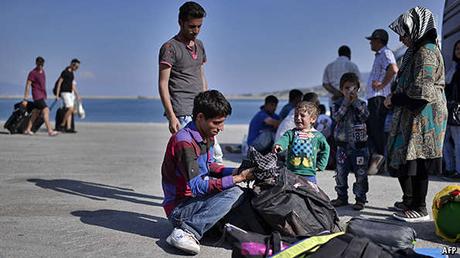
JUST five nautical miles of turquoise sea separate Turkey from the tourist town of Molyvos, on the Greek island of Lesbos. But the boat got stuck halfway across, says 24-year-old Mohammed Mahmoud. He and a half-dozen university friends fled their bombed-out home town of Aleppo, Syria a month earlier, making their way across Turkey. In Izmir they each paid €1,000 ($ 1,100) to smugglers who put them on a night bus with blacked-out windows, then ordered them out on a desolate hillside. They scrambled down to the water, young women clutching small children, and into a rubber dinghy, 54 in a boat made for 20. In mid-voyage the outboard motor died, says Mr Mahmoud: “We tried to fix it, but it fell off and sank.”
“He’s lying,” says Rafail Tsamouras, chief petty officer on the Hellenic Coast Guard patrol boat that picked the migrants up. The smugglers know the system, he says, and many tell the migrants to dump their motors once they enter Greek waters. The coast guard is required to rescue and transport them to the island’s migrant processing camps. Migrants who reach shore on their own must often walk 60km to the camps outside Mytilene, Lesbos’s…
The Economist: Europe

